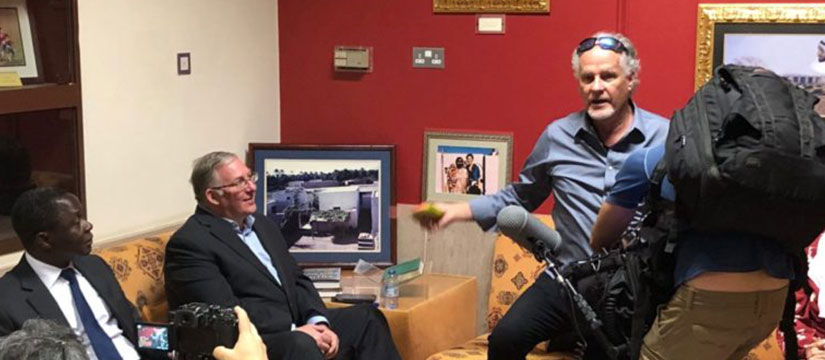
Medical missionaries built a hospital in the sand dunes of Arabia – and an enduring relationship with a nation – All Arab News
- November 25, 2022
- 0 Likes
- 1352 Views
- 0 Comments
Kanad Hospital: A Testament of Compassion and Legacy in the UAE Desert
AL-AIN, United Arab Emirates—Surrounded by sand dunes with no roads, running water or electricity, two American medical missionaries in the 1950s accepted the invitation of the ruling sheik of Abu Dhabi – Sheikh Zayed bin Sultan Al Nahyan – and founded a hospital deep in the desert, just one mile from the Omani border.
When they started, Marian and Berwick “Pat” Kennedy operated out of a tent with limited supplies as they slowly expanded their operations and services.
Now, Kanad Hospital – still managed today by Evangelical Christians – has expanded to a 130-bed complex with a staff of 600 employees and volunteers with the full backing of the government and the mutual love and respect of the local community.
It also represents the coexistence forged by the United Arab Emirates thanks to a personal connection with the ruling family – Crown Prince Mohamed bin Zayed Al Nahyan (MBZ) was born in that very hospital on March 11, 1961.
The doctors’ oldest son, Scott Kennedy, said the successful birth of the eventual national leader was at the core of a reciprocal relationship between his family and the ruling sheiks that has endured to this day.
“This is a small picture of the Abraham Accords relationship of love and trust,” he said.
Last week, the staff at the hospital welcomed an Evangelical delegation led by Joel Rosenberg during a trip to meet key leaders in Gulf nations that have joined the Abraham Accords.
Rosenberg wrote in his recent nonfiction book, “Enemies and Allies,” about the hospital and MBZ’s birth there – and how his relationship with the Kennedy family planted some of the seeds for his charting of this bold, new course to normalize ties with Israel. “Touched by the couple’s sincere faith and generosity, the sheikh (MBZ’s father) explained that his wife was pregnant and that they feared losing another child after several earlier miscarriages. But if the couple could help bring the baby to term, the sheikh would give them one of his own houses to serve as the clinic,” Rosenberg wrote.
“Sheikh Zayed kept his word and gave that missionary couple—Dr. Pat and Marian Kennedy—one of his homes for use as a clinic. Eventually a much larger facility, the Oasis Hospital, was built and helped to dramatically drive down the infant mortality rate. The hospital, run by evangelicals, is still operating in Abu Dhabi to this day and providing care to anyone in need, without regard to a person’s nationality or religious faith.”
At the time, infant mortality was 50% and maternal death rate was 30% during childbirth, according to Ralph Leo, founder of True Sojourners – a non-profit organization which runs the hospital today. Pat Kennedy was a general practitioner and Marian Kennedy, an obstetrician – exactly what the population needed. Their intervention changed these morbid statistics and enabled the citizenry to flourish and expand.
Scott recalled what MBZ said about his parents: “‘They were either majnoun (crazy) or they loved us. If I went into the desert, I would have run away.’”
While the founders had originally called the hospital “Oasis,” MBZ wanted to rename the hospital in honor of the Kennedys, whom the local Bedouins called “Kanad” because they couldn’t pronounce the Western name. Taxi drivers didn’t know how to get to Oasis, but everyone in the region knew “Kanad.”
Two years ago, Kanad Hospital was renamed in an official ceremony and, Leo said, the crown prince urged the hospital to go back to its roots of visitation, and faith-based practice. Visitation of patients was a vital part of its origins. The Kennedys treated patients with the highly contagious tuberculosis outside rather than treat them in the hospital. They visited them several times a day as the patients coalesced and they were able to keep the disease from spreading.
In the early years, under the primitive conditions, the doctors had to have someone hold a flashlight while they performed surgeries. On top of that, there was no blood bank. Miriam donated her own blood – sometimes to her own physical detriment. But since the hospital was initially focused on obstetrics, there was a great need for blood.
Brenda McLaughlin, the chief medical officer of Kanad Hospital and a Christian originally from Texas, said the hospital today still functions on its original mission – to honor God by providing exceptional whole person healthcare with the love and compassion of Jesus Christ.
During a meeting with Rosenberg’s delegation, Tara Leo – who heads community relations at the hospital and is Ralph Leo’s wife – summarized the Kennedy’s legacy and how their faithfulness in the trenches of the desert built an enduring relationship with an entire nation.
“They followed the example of Jesus in John 1:14: ‘The Word became flesh and dwelt among them,’” she said. “What his parents did was they came and dwelt with the people. That is so significant in this culture and you can’t understand it in the West.”
The Emiratis are “a generous people and they have never forgotten this,” she said.
Rosenberg summarized this in “Enemies and Allies.”
“Not coincidentally, perhaps, Sheikh Zayed looked favorably upon Christians from that point forward and allowed them to worship freely in the Emirates,” he wrote.
